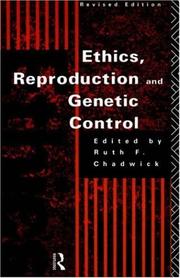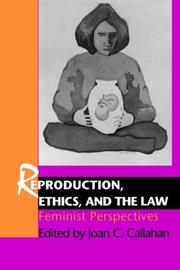| Listing 1 - 6 of 6 |
Sort by
|

ISBN: 2873740345 2762119502 9782873740344 Year: 1997 Volume: *30 Publisher: Namur Artel
Abstract | Keywords | Export | Availability | Bookmark
 Loading...
Loading...Choose an application
- Reference Manager
- EndNote
- RefWorks (Direct export to RefWorks)
Du clonage à l'insémination assistée, du diagnostic pré-implantatoire à la recherche embryonnaire, l'auteur, biologiste, tente à la lumière de réalités scientifiques très circonstanciées qu'il connaît bien, de rétablir une logique qui est forcément aussi la sienne.
Ethique philosophique --- Geneeskunde --- Médecine --- Recherche scientifique --- Wetenschappelijk onderzoek --- Wijsgerige ethiek --- #GBIB:CBMER --- kloneren (klonen, therapeutisch kloneren, reproductief kloneren) --- pre-implantatie genetische diagnose (PGD) --- sekseselectie (geslachtsselectie) --- vruchtbaarheid (fertiliteit, onvruchtbaarheid, steriliteit) --- intracytoplasmische spermainjectie --- reproductieve technologie (voortplantingstechnologie, medisch begeleide voortplanting, MBV, artificiële voortplanting, kunstmatige voortplanting) --- clonage (clonage thérapeutique, clonage reproductif) --- diagnostique génétique pré-implantatoire (DPI, diagnostic préimplantatoire) --- sélection de sexe (choix du sexe) --- fertilité (infertilité, sterilité) --- injection intra cytoplasmique de sperme --- technique de reproduction (technique de procréation, procréation médicalement assistée, PMA, procréation artificielle)

ISBN: 0742531511 0742531503 9780742531512 Year: 2004 Publisher: Totowa Rowman & Littlefield
Abstract | Keywords | Export | Availability | Bookmark
 Loading...
Loading...Choose an application
- Reference Manager
- EndNote
- RefWorks (Direct export to RefWorks)
As part of the Readings in Bioethics series, this volume collects critical essays by leading scholars on reproductive technologies, abortion, in vitro fertilization, prenatal diagnosis, and cloning.Over a decade ago the field of bioethics was established in response to the increased control over the design of living organisms afforded by both medical genetics and biotechnology. Since its introduction, bioethics has become established as an academic discipline with journals and professional societies, is covered regularly in the media, and affects people everyday around the globe. In response to the increasing need for information about medical genetics and biotechnology as well as the ethical issues these fields raise, Sheed & Ward proudly presents the Readings in Bioethics Series. Edited by Thomas A. Shannon, the series provides anthologies of critical essays and reflections by leading ethicists in four pivotal areas: reproductive technologies, genetic technologies, death and dying, and health care policy. The goal of this series is twofold: first, to provide a set of readers on thematic topics for introductory or survey courses in bioethics or for courses with a particular theme or time limitation.Second, each of the readers in this series is designed to help students focus more thoroughly and effectively on specific topics that flesh out the ethical issues at the core of bioethics. The series is also highly accessible to general readers interested in bioethics. This volume collects critical essays by leading scholars on reproductive technologies, abortion, in vitro fertilization, prenatal diagnosis, and cloning. Included in this volume are David Adamson, James P. Toner, Thomas A. Shannon, Bonnie Steinbock, Laura A. Schieve, Richard J. Paulson, G. Pennings, Thomas H. Murray, Lori B. Andrews, J. M. Phillips.
Reproductive technology --- Reproductive Techniques --- ethics --- reproductieve technologie (voortplantingstechnologie, medisch begeleide voortplanting, MBV, artificiële voortplanting, kunstmatige voortplanting) --- sekseselectie (geslachtsselectie) --- aids (HIV) --- kloneren (klonen) --- Assisted reproduction --- Reproduction --- Biotechnology --- ethics. --- technique de reproduction (technique de procréation, procréation médicalement assistée, PMA, assistance médicale à la procréation, AMP, procréation artificielle) --- sélection de sexe (choix du sexe) --- sida (VIH) --- clonage --- Technological innovations --- General ethics --- Gynaecology. Obstetrics --- Algemene ethiek --- Gynaecologie. Obstetrica --- ART (Assisted reproductive technology) --- Assisted reproductive technology --- Reproductive techniques --- Reproductive technology - Miscellanea --- Reproductive Techniques - ethics --- Ethics --- Book --- Courses

ISBN: 0521597072 0521592828 0511054351 0511613040 0511155166 Year: 1999 Volume: 11 Publisher: Cambridge : Cambridge University Press,
Abstract | Keywords | Export | Availability | Bookmark
 Loading...
Loading...Choose an application
- Reference Manager
- EndNote
- RefWorks (Direct export to RefWorks)
It is widely recognised that men and women in societies all over the world have very different experiences of sickness and health. This collection brings together biological and social anthropologists whose work illustrates how these sub-disciplines have approached the task of explaining such differences. We demonstrate that an understanding of science and culture, using the notions of biological 'sex' and socio-culturally constructed 'gender' are both essential for furthering analyses of men's and women's, boys' and girls' experiences of health and disease. We address the important topics of gender differences in parental care, cardiovascular disease, reproductive health and psychological illness, and look at how the medicalisation of women and their relative absence from models of population health might affect their experiences of preventative health measures. This book will be particularly useful for students on human sciences or anthropology courses, or anyone wishing to gain an interdisciplinary perspective on the subject.
Anthropologie médicale --- Antropologie [Medische ] --- Medical anthropology --- Medische antropologie --- Health --- Medical anthropology. --- Cross-cultural studies. --- Sex differences. --- Sex Factors --- Anthropology, Cultural --- Disease Susceptibility --- Prejudice --- Women's Health --- gender --- sekseselectie (geslachtsselectie) --- gezondheid --- Woman's Health --- Womens Health --- Health, Woman's --- Health, Women's --- Health, Womens --- Prejudices --- Cultural Anthropology --- Ethnography --- Ethnographies --- Qualitative Research --- Normalcy --- Normality --- Normalities --- Personal health --- Wellness --- Medicine --- Physiology --- Diseases --- Holistic medicine --- Hygiene --- Well-being --- Medical care --- Anthropology --- Susceptibility, Disease --- Diathesis --- Diatheses --- Disease Susceptibilities --- Susceptibilities, Disease --- Factor, Sex --- Factors, Sex --- Sex Factor --- genre --- sélection de sexe (choix du sexe) --- santé --- Anthropological aspects --- Cross-cultural studies --- Sex differences --- Anti-Semitism --- Islamophobia --- Anti Semitism --- Anti-Semitisms --- Islamophobias --- Material Culture --- Culture, Material --- Material Cultures --- Implicit Bias --- Bia, Implicit --- Bias, Implicit --- Life Sciences --- General and Others

ISBN: 2742000860 9782742000869 Year: 1995 Publisher: Montrouge Libbey
Abstract | Keywords | Export | Availability | Bookmark
 Loading...
Loading...Choose an application
- Reference Manager
- EndNote
- RefWorks (Direct export to RefWorks)
Human reproduction --- Bioethics --- Reproduction humaine --- Bioéthique --- Moral and ethical aspects --- Congresses --- Aspect moral --- Congrès --- Ethique médicale --- 174.2 --- #GBIB:CBMER --- Reproduction --- Ethics, Medical --- Reproductive Techniques --- anticonceptie (voorbehoedsmiddelen, contraceptie, geboortecontrole) --- foetaal weefsel --- neonatale intensieve zorg --- eiceldonatie (eicel) --- zaadceldonatie (spermadonatie) --- draagmoederschap (zwangerschap-voor-een-ander, draagmoeder, surrogaatmoeder) --- vrouwenbesnijdenis (vrouwelijke genitale verminking) --- sekseselectie (geslachtsselectie) --- embryo-onderzoek (embryo's in vitro) --- Reproduction Technics --- Reproduction Techniques --- Reproductive Technologies --- Technology, Reproductive --- Reproductive Technology --- Reproduction Technic --- Reproduction Technique --- Reproductive Technique --- Technic, Reproduction --- Technics, Reproduction --- Technique, Reproduction --- Technique, Reproductive --- Techniques, Reproduction --- Techniques, Reproductive --- Technologies, Reproductive --- Selective Breeding --- Reproductive Medicine --- Reproductive Health Services --- Medical Ethics --- Medicine --- Professionalism --- Human Reproductive Index --- Human Reproductive Indexes --- Reproductive Period --- Human Reproductive Indices --- Index, Human Reproductive --- Indexes, Human Reproductive --- Indices, Human Reproductive --- Period, Reproductive --- Periods, Reproductive --- Reproductive Index, Human --- Reproductive Indices, Human --- Reproductive Periods --- Human physiology --- Reproductive health --- Reproductive rights --- Beroepsmoraal van de artsen. Medische beroepsethiek --- contraception (contrôle des naissances) --- tissus foetaux --- soins néonataux intensifs --- don d'ovules (don d'ovocytes, ovule, ovocyte) --- don de sperme --- maternité de substitution (grossesse de substitution, gestation pour autrui, mère-porteuse, mère de substitution) --- excision (circoncision féminine, mutilation sexuelle féminine) --- sélection de sexe (choix du sexe) --- recherche sur l'embryon (embryons in vitro) --- ethics --- Conferences - Meetings --- 174.2 Beroepsmoraal van de artsen. Medische beroepsethiek --- Bioéthique --- Congrès --- Morale --- Reproduction humaine - Aspect moral - Congres --- Ethique médicale - Congrès --- Éthique des médecins -- actes de congrès --- Fécondation in vitro --- Procréation médicalement assistée --- Reproduction techniques

ISBN: 1280651849 9786610651849 0203007832 9780203007839 6610651841 9780415089791 0415089794 0415089794 9781134877935 9781134877973 9781134877980 9781138159280 Year: 1992 Publisher: London New York Routledge
Abstract | Keywords | Export | Availability | Bookmark
 Loading...
Loading...Choose an application
- Reference Manager
- EndNote
- RefWorks (Direct export to RefWorks)
In this revised edition with a new preface from the editor, leading scientists explain the nature and goals of `test tube' reproduction and genetic engineering, and their eugenic implications. In contrast to the Warnock report, the extended commentary considers the issues in the context of a social ethic rather than the individualist viewpoint.
Eugenics --- Genetic engineering --- Human reproduction --- Homiculture --- Race improvement --- Euthenics --- Heredity --- Involuntary sterilization --- Moral and ethical aspects. --- Ethics, Medical --- Genetic Engineering --- Reproduction --- eugenetica (eugenese, eugenetiek) --- genetische engineering (manipulatie, gentechnologie) --- in-vitrofertilisatie (bevruchting in vitro, proefbuisbaby's) --- sekseselectie (geslachtsselectie) --- #GBIB:CBMER --- Engineering, Genetic --- Intervention, Genetic --- Genetic Intervention --- Genetic Interventions --- Interventions, Genetic --- Biotechnology --- Cloning, Molecular --- DNA, Recombinant --- Industrial Microbiology --- Artificial Gene Fusion --- Organisms, Genetically Modified --- Animals, Genetically Modified --- Plants, Genetically Modified --- Human Reproductive Index --- Human Reproductive Indexes --- Reproductive Period --- Human Reproductive Indices --- Index, Human Reproductive --- Indexes, Human Reproductive --- Indices, Human Reproductive --- Period, Reproductive --- Periods, Reproductive --- Reproductive Index, Human --- Reproductive Indices, Human --- Reproductive Periods --- Negative Eugenics --- Positive Eugenics --- Eugenics, Negative --- Eugenics, Positive --- Selective Breeding --- Genetic Counseling --- Genetics, Medical --- Medical Ethics --- Medicine --- Professionalism --- Bioethics --- Moral and ethical aspects --- eugénisme (eugénique) --- génie génétique (ingénierie, manipulation génétique) --- fécondation in vitro (fertilisation in vitro, FIV, fécondation in vitro et embryo transfert, FIVETE) --- sélection de sexe (choix du sexe) --- ethics --- Ethics --- Eugenics. --- Genetic intervention. --- Reproduction. --- Medical. --- Eugenics - Moral and ethical aspects --- Genetic engineering - Moral and ethical aspects --- Human reproduction - Moral and ethical aspects

ISBN: 025320996X 0253329388 Year: 1995 Publisher: Bloomington Indiana university press
Abstract | Keywords | Export | Availability | Bookmark
 Loading...
Loading...Choose an application
- Reference Manager
- EndNote
- RefWorks (Direct export to RefWorks)
"Reproduction, Ethics, and the Law" addresses some of the most pressing moral and legal quandaries in contemporary society - those revolving around human reproduction. Technology can both limit and assist childbearing. Courts have assigned legal parenthood to genetic parents of children carried to term by women genetically unrelated to them, and courts have also passed over genetic progenitors to assign parenthood to individuals socially related to children. With developments in medical and surgical interventions for foetus', we have also seen court cases holding women responsible for causing prenatal harm, as well as a landmark Supreme Court decision that might well release industry from liability for causing prenatal harm in the workplace. Scientists are able to use tissue from aborted fetuses to substantially alter the quality of life for persons afflicted with progressive, debilitating disease, and they are now able to fertilize and implant in women's wombs eggs harvested from aborted female fetuses. Physicians are able to sustain infants with no hope for characteristically human lives long enough to make their organs available to other infants in vital need; and they are able to perform prenatal diagnoses that encourage elective abortion. This collection of essays adds to the feminist dimension of the public discussion of how these issues should be addressed. The contributors broaden the discussion considerably in focusing on issues beyond abortion and reproductive technologies, bringing together such themes as surrogacy, adoption, and infertility; frozen embryos and fathers rights; RU 486; foetal harm; and industrial health hazards for women. This volume brings together feminist social and philosophical theory with a practical awareness of concrete social problems and an understanding of new technologies. The contributors are Barbara J. Berg, Joan E. Bertin, Joan C. Callahan, Janet Gallagher, Helen B. Holmes, Joan Mahoney, Mary B. Mahowald, Uma Narayan, Christine Overall, Laura Purdy, Mary L. Shanley, Janice G. Raymond, Patricia Smith, and Rosemarie Tong.
Feminism--Philosophy --- Feminist sociology --- Feminist theory --- Feministische theorie --- Theory of feminism --- Théorie féministe --- Feminist theory. --- Human reproductive technology --- Government policy. --- Moral and ethical aspects. --- Social aspects. --- reproductieve technologie --- feminisme (feministische visie) --- ouderschap --- abortus (vrijwillige zwangerschapsafbreking) --- anticonceptie (voorbehoedsmiddelen, contraceptie, geboortecontrole) --- embryo-onderzoek (embryo's in vitro) --- sekseselectie (geslachtsselectie) --- technique de reproduction --- féminisme --- parentalité --- avortement (interruption volontaire de grossesse, IVG) --- contraception (contrôle des naissances) --- recherche sur l'embryon (embryons in vitro) --- sélection de sexe (choix du sexe) --- Humanism --- Parents --- Therapeutics --- Genetic Engineering --- Persons --- Health Care Economics and Organizations --- Embryonic Structures --- Ethics, Clinical --- Patient Rights --- Diseases --- Prenatal Injuries --- Germ Cells --- Sexual Behavior --- Estrenes --- Health Behavior --- Family Relations --- Investigative Techniques --- Economics --- Genital Diseases, Male --- Genital Diseases, Female --- Sociology --- Tissue Preservation --- Preservation, Biological --- Tissue Transplantation --- Patient Acceptance of Health Care --- Environmental Pollutants --- Maternal Behavior --- Technology, Industry, and Agriculture --- Delivery, Obstetric --- Psychology, Social --- Reproductive Physiological Phenomena --- Women --- Mental Disorders --- Socioeconomic Factors --- Reproductive Physiological Processes --- Reproductive Techniques, Assisted --- Social Problems --- Insemination --- Social Sciences --- Obstetric Surgical Procedures --- Chemicals and Drugs --- Family --- Behavior --- Technology, Industry, Agriculture --- Named Groups --- Histocytological Preparation Techniques --- Psychiatry and Psychology --- Analytical, Diagnostic and Therapeutic Techniques and Equipment --- Ethics, Professional --- Pregnancy Complications --- Surgical Procedures, Operative --- Health Care --- Transplantation --- Anatomy --- Toxic Actions --- Ethics --- Anthropology, Education, Sociology and Social Phenomena --- Male Urogenital Diseases --- Genitalia --- Genetic Techniques --- Attitude to Health --- Female Urogenital Diseases --- Population Characteristics --- Behavior and Behavior Mechanisms --- Nuclear Family --- Reproductive and Urinary Physiological Phenomena --- Specimen Handling --- Cells --- Estranes --- Philosophy --- Phenomena and Processes --- Steroids --- Laboratory Techniques and Procedures --- Chemical Actions and Uses --- Delivery of Health Care --- Female Urogenital Diseases and Pregnancy Complications --- Urogenital System --- Humanities --- Histological Techniques --- Cytological Techniques --- Polycyclic Compounds --- Diagnosis --- Health Care Quality, Access, and Evaluation --- Clinical Laboratory Techniques --- Cryopreservation --- Infertility --- Insemination, Artificial --- Spermatozoa --- Tissue Donors --- Fathers --- Poverty --- Sex Preselection --- Civil Rights --- Homosexuality --- Human Rights --- Social Control, Formal --- Oocyte Donation --- Treatment Refusal --- Ethics, Medical --- Feminism --- Government Regulation --- Prejudice --- Sexuality --- Abortion, Eugenic --- Fees and Charges --- Mifepristone --- Industry --- Reproductive Techniques --- Cesarean Section --- Fetal Tissue Transplantation --- Disabled Persons --- Maternal-Fetal Relations --- Parent-Child Relations --- Reproduction --- Jurisprudence --- Internationality --- Pharmaceutical Preparations --- Prenatal Exposure Delayed Effects --- Embryo, Mammalian --- Pregnancy --- Surrogate Mothers --- Substance-Related Disorders --- Pregnant Women --- Women's Rights --- Abortion, Induced --- Adoption --- Fetus --- International Cooperation --- Hazardous Substances --- Contraception --- Minority Groups --- Medicine --- Health & Biological Sciences --- Gynecology & Obstetrics --- Moral and ethical aspects --- Social aspects --- Government policy --- Human reproductive technology - Government policy. --- Assisted human reproduction --- Assisted conception --- Conception --- Human assisted reproduction --- Human reproduction --- Medical technology --- Reproductive technology --- Feminist philosophy --- Technological innovations --- Assisted human reproductive technology --- Human assisted reproductive technology
| Listing 1 - 6 of 6 |
Sort by
|

 Search
Search Feedback
Feedback About UniCat
About UniCat  Help
Help News
News